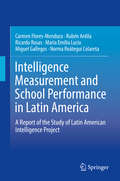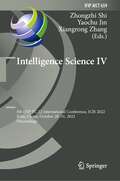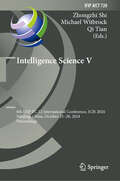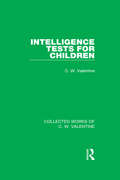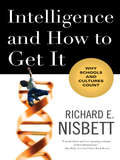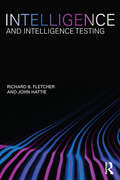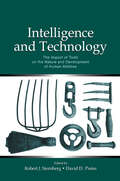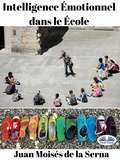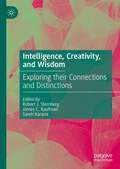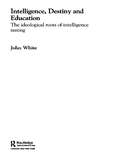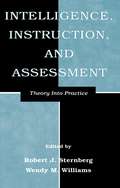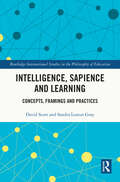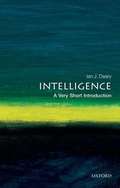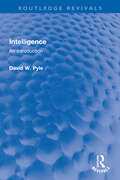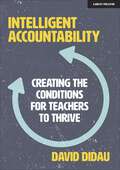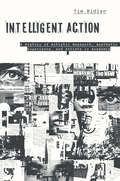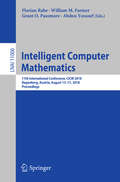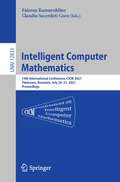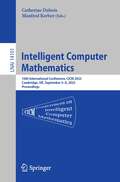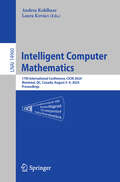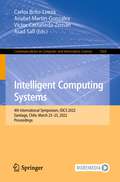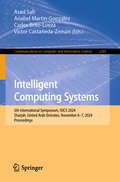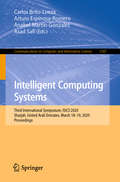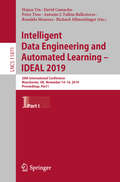- Table View
- List View
Intelligence Measurement and School Performance in Latin America: A Report of the Study of Latin American Intelligence Project
by Carmen Flores-Mendoza Rubén Ardila Ricardo Rosas María Emilia Lucio Miguel Gallegos Norma Reátegui ColaretaThis book presents the results of the most complete and updated assessment of cognitive resources of students in Latin America: the Study of Latin American Intelligence (SLATINT). During four years, top researchers of the region used a standardized set of cognitive measures to assess 4,000 students aged between 14 and 15 years from six countries: Brazil, Argentina, Mexico, Chile, Colombia and Peru. The data collected and now analyzed in this volume is a first step to understand the human cognitive capital of the region, a crucial resource for any country today. Intelligence research has shown that the cognitive skills of a population are strongly associated with the school performance of its students and the development of a nation. This makes Intelligence Measurement and School Performance in Latin America a valuable tool both for Latin American researchers and authorities engaged in the improvement of each country’s human resources and for psychologists, educators and other social scientists dedicated to the study of the impact of intelligence in the development of nations.
Intelligence Science IV: 5th IFIP TC 12 International Conference, ICIS 2022, Xi'an, China, October 28–31, 2022, Proceedings (IFIP Advances in Information and Communication Technology #659)
by Zhongzhi Shi Yaochu Jin Xiangrong ZhangThis book constitutes the refereed proceedings of the 5th International Conference on Intelligence Science, ICIS 2022, held in Xi'an, China, in August 2022. The 41 full and 5 short papers presented in this book were carefully reviewed and selected from 85 submissions. They were organized in topical sections as follows: Brain cognition; machine learning; data intelligence; language cognition; remote sensing images; perceptual intelligence; wireless sensor; and medical artificial intelligence.
Intelligence Science V: 6th IFIP TC 12 International Conference, ICIS 2024, Nanjing, China, October 25–28, 2024, Proceedings (IFIP Advances in Information and Communication Technology #720)
by Qi Tian Zhongzhi Shi Michael WitbrockThis book constitutes the refereed proceedings of the 6th IFIP TC 12 International Conference on Intelligence Science, ICIS 2024, held in Nanjing, China, in October 25-28, 2024. The 23 full papers and 2 short papers presented here were carefully reviewed and selected from 32 submissions. These papers have been categorized into the following sections: Machine Learning; Causal Reasoning; Large Language Model; Intelligent Robot; Perceptual Intelligence; AI for Science; Medical Artificial Intelligence.
Intelligence Tests for Children (Collected Works of C.W. Valentine)
by C.W. ValentineOriginally published in 1945, this title was intended mainly for use by teachers wishing to test children from ages 2-8 in order to establish their intelligence. Based on feedback to the author, this revised edition also includes tests for children up to the age of 15. The tests were used to give a teacher some idea of how much could be expected of each child, so that the class, when practicable, could be divided into groups of varying abilities, which could proceed at paces suited to their respective capacities. It was felt that if ‘inborn intellectual deficiencies’ could be identified at an early age the children could have ‘special treatment’, or in certain cases be placed in a ‘special school’, rather than be potentially written off as ‘lazy’. Today this can be read and enjoyed in its historical context.
Intelligence and How to Get It: Why Schools and Cultures Count
by Richard E. Nisbett"[Nisbett] weighs in forcefully and articulately . . . [using] a thoroughly appealing style to engage . . . throughout."--Publishers Weekly Who are smarter, Asians or Westerners? Are there genetic explanations for group differences in test scores? From the damning research of The Bell Curve to the more recent controversy surrounding geneticist James Watson's statements, one factor has been consistently left out of the equation: culture. In the tradition of Stephen Jay Gould's The Mismeasure of Man, world-class social psychologist Richard E. Nisbett takes on the idea of intelligence as biologically determined and impervious to culture with vast implications for the role of education as it relates to social and economic development. Intelligence and How to Get It asserts that intellect is not primarily genetic but is principally determined by societal influences.
Intelligence and Intelligence Testing
by John Hattie Richard B FletcherHave you ever wondered what IQ is and how it is measured? Why is there such a premium placed on high IQ? What do we mean by intelligence? What does your IQ score mean? There can be no denying the enduring appeal of IQ over the last century. It is probably one of the most misunderstood yet highly researched psychological constructs ever. Such has been the controversy surrounding this topic that it is difficult to distinguish fact from fiction. Intelligence and Intelligence Testing is a text that aims to address that. This book examines the controversial psychological construct that is IQ, discussing and reviewing the history and current status of the research on intelligence and providing an overview of its development, measurement and use. From Galton, Spearman and Binet to the relatively recent controversy caused by the research of Herrnstein and Murray, this important book makes a major claim about the importance today of ‘problem solving on demand’ as one of the key components of today’s notions of intelligence. Chapters include coverage of: Intelligence and schooling; Cultural differences in views of intelligence; The history of IQ testing and its emergence into public consciousness; IQ as predictor of educational and occupational outcomes; Psychometrics and measurement of intelligence; The future of intelligence research. Written by Richard B. Fletcher and John Hattie, the author of the highly-regarded Visible Learning, this textbook will be invaluable for all undergraduate and Masters level students studying the theory of intelligence and the impact of testing on educational. Detailed and annotated further reading lists and a glossary of terms are also included.
Intelligence and Technology: The Impact of Tools on the Nature and Development of Human Abilities (Educational Psychology Ser.)
by Robert J. Sternberg David D. PreissIn this volume, Robert J. Sternberg and David D. Preiss bring together different perspectives on understanding the impact of various technologies on human abilities, competencies, and expertise. The inclusive range of historical, comparative, sociocultural, cognitive, educational, industrial/organizational, and human factors approaches will stimula
Intelligence Émotionnel dans le École
by Juan Moisés de la SernaParler de l'Intelligence émotionnelle est de le faire maintenant, en termes de développement de la personne, un aspect qui a été en plein essor depuis des dizaines d'années et dont la portée a été utile non seulement dans le champ si vous n'avez pas également. De plus en plus, il y a plus d'études qui s'accumulent sur les avantages d'un bon développement de l'Intelligence Émotionnelle, recommandé pour être formé en elle-le plus tôt sera le mieux. Par conséquent, l'école est le droit de l'environnement pour les petits et même les adolescents à connaître et à développer l'Intelligence Émotionnelle.
Intelligence, Creativity, and Wisdom: Exploring their Connections and Distinctions
by Robert J. Sternberg James C. Kaufman Sareh KaramiThis edited collection examines the interrelationships between the psychological concepts of intelligence, creativity, and wisdom, while also presenting a systematic attempt to combine them within the overarching concept of meta-intelligence. Building on Robert J. Sternberg’s previous work, this authoritative volume brings together leading researchers in the field of intelligence, creativity, and wisdom to show the latest advances in this line of research through a selection of 18 chapters. Using a wide range or approaches, including psychological, cognitive, educational, and philosophical perspectives, internationally renowned scholars offer insights into the benefits of re-thinking our understanding of intelligence, creativity, and wisdom, and how they may helpfully be more integrated.This wide-ranging collection will appeal in particular to students and scholars of cognitive, differential, social, developmental, and educational psychology, as well as creativity studies, education, philosophy, and related disciplines.
Intelligence, Destiny and Education: The Ideological Roots of Intelligence Testing
by John WhiteThe nature of intelligence and how it can be measured has occupied psychologists, educationalists, biologists and philosophers for hundreds of years. However, there has been little investigation into the rise of the traditional dominant educational ideology that intelligence and IQ have innate limits and are unchanging and unchangeable. This book traces the roots of this mind set back to early puritan communities on both sides of the Atlantic, drawing parallels between puritan dogma and the development of the traditional curricula and selection processes that are still firmly embedded in school practice today. Drawing on the work of Galton, Pearson, Burt, Goddard, Terman and others in his search for the truth about intelligence testing, John White looks at the personal histories and socialised religious backgrounds of these key psychologists and casts an entirely new light on schooling in Britain and the USA in modern times. This work also shows how we can transcend this heritage and base our educational system on values and practices more in tune with the twenty-first century.
Intelligence, Instruction, and Assessment: Theory Into Practice (Educational Psychology Series)
by Robert J. Sternberg Wendy M. WilliamsIntelligence, Instruction, and Assessment shows how modern theories of intelligence can be directly applied by educators to the teaching of subject matter, regardless of the age of the students or the content being taught. It is intended primarily for teachers at all levels--elementary, secondary, tertiary--who want to apply in their classrooms what we know about intelligence. The focus is not on modifying students' intelligence, per se, but on increasing their disciplinary knowledge and understanding. Hence, this book will help teachers learn how they can teach more effectively what they are already teaching. The assumption is that what teachers care most about is how they can improve upon what they are already doing, and how they can learn what they need to do in order to be more effective in their work. The contributors are well known for their work on intelligence and education. Each chapter includes an accessible explanation of the author's theory of intelligence, and discusses the implications of that theory both for instruction and for assessment. The book is international in scope, reflecting both American and European perspectives. Anyone interested in knowing how modern theories of intelligence can be applied to education will want to read this book--particularly teachers and other education specialists, as well as developmental psychologists, cognitive psychologists, and philosophers with an interest in applying psychological theory to classroom practice. It will serve well as a text for courses on educational psychology, intelligence, cognition and instruction, and foundations of teaching.
Intelligence, Sapience and Learning: Concepts, Framings and Practices (Routledge International Studies in the Philosophy of Education)
by David Scott Sandra Leaton GrayExamining the idea of intelligence in its diverse sociological and philosophical formations, Intelligence, Sapience and Learning explores the multiple and often complex meanings associated with the concept of intelligence, and its relationships with learning, curriculum and sapience. Scott and Leaton Gray explain a series of key concepts central to understanding the meta-concepts and practices of intelligence, learning and curriculum. These concepts include epistemology, free will and volition, hermeneutics, pragmatism, strong normative evaluations and pedagogy, amongst others. Focusing on six praxes that form a genealogy of the concept of intelligence, Scott and Leaton Gray argue for a re-framing of the concept and practice of intelligence, with profound consequences for how modern societies should be organised and how people should live their lives. This book is a follow-up to Women Curriculum Theorists: Power, Knowledge and Subjectivity, and takes a fresh look at the concept and practice of intelligence. It will appeal to curriculum theorists and those with an interest in curriculum and learning matters, as well as those working in the philosophy and sociology of education.
Intelligence: A Very Short Introduction
by Ian J. DearyFor people with little or no knowledge of the science of human intelligence, this volume takes readers to a stage where they are able to make judgments for themselves about the key questions of human mental ability. Each chapter addresses a central scientific issue but does so in a way that is lively and completely accessible. Issues discussed include whether there are several different types of intelligence, whether intelligence differences are caused by genes or the environment, the biological basis of intelligence levels, and whether intelligence declines as we grow older.
Intelligence: An Introduction (Routledge Revivals)
by David W. PyleIntelligence (1979) examines the many complex issues which concern this aspect of learning and development. It is intended as a primer and introduction not only to the concept of intelligence itself but also to the technical and to the educational aspects of the subject. It brings together and critically discusses various views of intelligence, including the psychometric, the developmental and the behavioural.
Intelligent Accountability: Creating the conditions for teachers to thrive
by David DidauUncertainty is a fact of life. You can never know enough to make perfect decisions. Understanding this helps us balance an awareness of our tendency towards overconfidence with an acceptance of our own fallibility. The book discusses two opposed models of school improvement: the deficit model (which assumes problems are someone’s fault) and the surplus model (which assumes problems are unintended systemic flaws). By aligning ourselves to a surplus model we can create a system of Intelligent Accountability.The principles that make this possible are trust, accountability and fairness. While we thrive when trusted, unless someone cares about – and is holding us to account – for what we do, we’re unlikely to be our best. Some teachers deserve more trust and require less scrutiny than others, but in order to satisfy the demands of equality we end up treating all teachers as equally untrustworthy. The more we trust teachers, the more autonomy they should be given. To pursue a system of fair inequality we must accept that autonomy must be earned.
Intelligent Accountability: Creating the conditions for teachers to thrive
by David DidauUncertainty is a fact of life. You can never know enough to make perfect decisions. Understanding this helps us balance an awareness of our tendency towards overconfidence with an acceptance of our own fallibility. The book discusses two opposed models of school improvement: the deficit model (which assumes problems are someone’s fault) and the surplus model (which assumes problems are unintended systemic flaws). By aligning ourselves to a surplus model we can create a system of Intelligent Accountability.The principles that make this possible are trust, accountability and fairness. While we thrive when trusted, unless someone cares about – and is holding us to account – for what we do, we’re unlikely to be our best. Some teachers deserve more trust and require less scrutiny than others, but in order to satisfy the demands of equality we end up treating all teachers as equally untrustworthy. The more we trust teachers, the more autonomy they should be given. To pursue a system of fair inequality we must accept that autonomy must be earned.
Intelligent Action: A History of Artistic Research, Aesthetic Experience, and Artists in Academia
by Timothy RidlenThrough archival research and analysis of artworks by Gyorgy Kepes, Allan Kaprow, Mel Bochner, and Suzanne Lacy, among others, Intelligent Action examines how these artists brought alternatives to dominant conceptions of research and knowledge production. The book is organized around specific institutional formations—artistic research centers, proposals, exhibitions on college campuses, and the establishment of new schools or pedagogic programs. Formal and social analysis demonstrate how artists responded to ideas of research, knowledge production, information, and pedagogy. Works discussed were produced between 1958 and 1975, a moment when boundaries between media were breaking down in response to technological, cultural, and generational change. In the context of academia, these artistic practices have taken up the look, feel, or language of various research and teaching practices. In some cases, artists bent to the demands of the cold war research university, while in others, artists developed new modes of practice and pedagogy. Reading these works through their institutional histories, author Tim Ridlem shows how artistic research practices and artistic subjectivity developed in the long 1960s within and alongside academia, transforming the role of artists in the process.
Intelligent Computer Mathematics: 11th International Conference, CICM 2018, Hagenberg, Austria, August 13-17, 2018, Proceedings (Lecture Notes in Computer Science #11006)
by Florian Rabe William M. Farmer Grant O. Passmore Abdou YoussefThis book constitutes the refereed proceedings of the 11th International Conference on Intelligent Computer Mathematics, CICM 2018, held in Hagenberg, Austria, in August 2018. The 23 full papers presented were carefully reviewed and selected from a total of 36 submissions. The papers focos on the Calculemus, Digital Mathematics Libraries, and Mathematical Knowledge Management tracks which also correspond to the subject areas of the predecessor meetings. Orthogonally, the Systems and Projects track called for descriptions of digital resources, such as data and systems, and of projects, whether old, current, or new, and survey papers covering any topics of relevance to the CICM community.
Intelligent Computer Mathematics: 14th International Conference, CICM 2021, Timisoara, Romania, July 26–31, 2021, Proceedings (Lecture Notes in Computer Science #12833)
by Fairouz Kamareddine Claudio Sacerdoti CoenThis book constitutes the refereed proceedings of the 14th International Conference on Intelligent Computer Mathematics, CICM 2021, held in Timisoara, Romania, in July 2021*.The 12 full papers, 7 system descriptions, 1 system entry, and 3 abstracts of invited papers presented were carefully reviewed and selected from a total of 38 submissions. The papers focus on advances in formalization, automatic theorem proving and learning, search and classification, teaching and geometric reasoning, and logic and systems, among other topics.* The conference was held virtually due to the COVID-19 pandemic.
Intelligent Computer Mathematics: 16th International Conference, CICM 2023, Cambridge, UK, , September 5–8, 2023 Proceedings (Lecture Notes in Computer Science #14101)
by Manfred Kerber Catherine DuboisThis book constitutes the refereed proceedings of the 16th International Conference on Intelligent Computer Mathematics, CICM 2023, held in Cambridge, UK, in September 2023.The 14 full papers, 2 project/survey papers, 6 short papers, and 1 tool paper presented were carefully reviewed and selected from a total of 37 submissions. The papers focus on advances in formalization, automatic theorem proving and learning, search and classification, teaching and geometric reasoning, and logic and systems, among other topics.
Intelligent Computer Mathematics: 17th International Conference, CICM 2024, Montréal, QC, Canada, August 5–9, 2024, Proceedings (Lecture Notes in Computer Science #14960)
by Andrea Kohlhase Laura KovácsThis book constitutes the refereed proceedings of the 17th International Conference on Intelligent Computer Mathematics, CICM 2024, held in Montréal, Québec, Canada, during August 5–9, 2024. The 21 full papers presented were carefully reviewed and selected from 28 submissions. These papers have been categorized into the following sections: AI and LLM; Proof Assistants; Logical Frameworks and Transformations; Knowledge Representation and Certification; Proof Search and Formalization & System Descriptions.
Intelligent Computing Systems: 4th International Symposium, ISICS 2022, Santiago, Chile, March 23–25, 2022, Proceedings (Communications in Computer and Information Science #1569)
by Anabel Martin-Gonzalez Carlos Brito-Loeza Asad Safi Victor Castañeda-ZemanThis book constitutes the proceedings of the 4th International Symposium on Intelligent Computing Systems, ISICS 2022, held in Santiago, Chile, in March 2022. Due to the COVID-19 pandemic the conference was held online. The 9 full papers along with 2 short papers presented in this volume were carefully reviewed and selected from 30 submissions. They deal with the field of intelligent computing systems focusing on artificial intelligence, computer vision and image processing.
Intelligent Computing Systems: 5th International Symposium, ISICS 2024, Sharjah, United Arab Emirates, November 6–7, 2024, Proceedings (Communications in Computer and Information Science #2381)
by Anabel Martin-Gonzalez Carlos Brito-Loeza Asad Safi Victor Castañeda-ZemanThis book constitutes the proceedings of the 5th International Symposium on Intelligent Computing Systems, ISICS 2024, held in Sharjah, United Arab Emirates, during November 6-7, 2024. The 25 full papers included in this book were carefully reviewed and selected from 71 submissions. They focus on research and practice in the fields of artificial intelligence, computer vision, and image processing.
Intelligent Computing Systems: Third International Symposium, ISICS 2020, Sharjah, United Arab Emirates, March 18–19, 2020, Proceedings (Communications in Computer and Information Science #1187)
by Anabel Martin-Gonzalez Carlos Brito-Loeza Arturo Espinosa-Romero Asad SafiThis book constitutes the proceedings of the Third International Symposium on Intelligent Computing Systems, ISICS 2020, held in Sharjah, United Arab Emirates, in March 2020. The 13 full papers presented in this volume were carefully reviewed and selected from 46 submissions. They deal with the field of intelligent computing systems focusing on artificial intelligence, computer vision and image processing.
Intelligent Data Engineering and Automated Learning – IDEAL 2019: 20th International Conference, Manchester, UK, November 14–16, 2019, Proceedings, Part I (Lecture Notes in Computer Science #11871)
by Ronaldo Menezes David Camacho Hujun Yin Antonio J. Tallón-Ballesteros Peter Tino Richard AllmendingerThis two-volume set of LNCS 11871 and 11872 constitutes the thoroughly refereed conference proceedings of the 20th International Conference on Intelligent Data Engineering and Automated Learning, IDEAL 2019, held in Manchester, UK, in November 2019. The 94 full papers presented were carefully reviewed and selected from 149 submissions. These papers provided a timely sample of the latest advances in data engineering and machine learning, from methodologies, frameworks, and algorithms to applications. The core themes of IDEAL 2019 include big data challenges, machine learning, data mining, information retrieval and management, bio-/neuro-informatics, bio-inspired models (including neural networks, evolutionary computation and swarm intelligence), agents and hybrid intelligent systems, real-world applications of intelligent techniques and AI.
